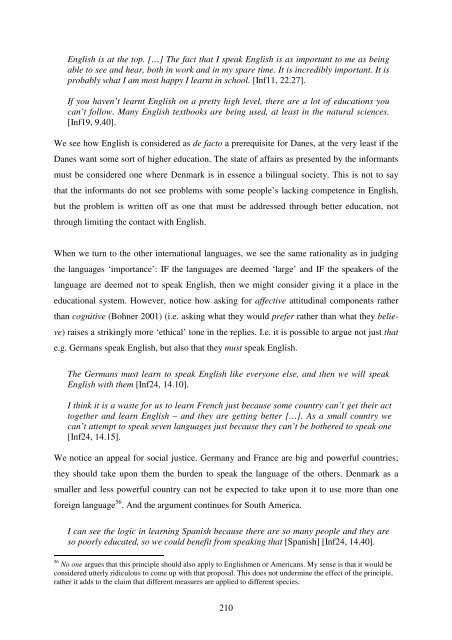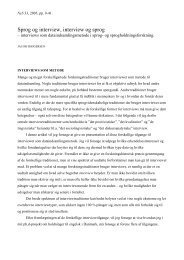Hør dog hvad de siger - Note-to-Self: Trials & Errors
Hør dog hvad de siger - Note-to-Self: Trials & Errors
Hør dog hvad de siger - Note-to-Self: Trials & Errors
You also want an ePaper? Increase the reach of your titles
YUMPU automatically turns print PDFs into web optimized ePapers that Google loves.
English is at the <strong>to</strong>p. […] The fact that I speak English is as important <strong>to</strong> me as being<br />
able <strong>to</strong> see and hear, both in work and in my spare time. It is incredibly important. It is<br />
probably what I am most happy I learnt in school. [Inf11, 22.27].<br />
If you haven’t learnt English on a pretty high level, there are a lot of educations you<br />
can’t follow. Many English textbooks are being used, at least in the natural sciences.<br />
[Inf19, 9.40].<br />
We see how English is consi<strong>de</strong>red as <strong>de</strong> fac<strong>to</strong> a prerequisite for Danes, at the very least if the<br />
Danes want some sort of higher education. The state of affairs as presented by the informants<br />
must be consi<strong>de</strong>red one where Denmark is in essence a bilingual society. This is not <strong>to</strong> say<br />
that the informants do not see problems with some people’s lacking competence in English,<br />
but the problem is written off as one that must be addressed through better education, not<br />
through limiting the contact with English.<br />
When we turn <strong>to</strong> the other international languages, we see the same rationality as in judging<br />
the languages ‘importance’: IF the languages are <strong>de</strong>emed ‘large’ and IF the speakers of the<br />
language are <strong>de</strong>emed not <strong>to</strong> speak English, then we might consi<strong>de</strong>r giving it a place in the<br />
educational system. However, notice how asking for affective attitudinal components rather<br />
than cognitive (Bohner 2001) (i.e. asking what they would prefer rather than what they belie-<br />
ve) raises a strikingly more ‘ethical’ <strong>to</strong>ne in the replies. I.e. it is possible <strong>to</strong> argue not just that<br />
e.g. Germans speak English, but also that they must speak English.<br />
The Germans must learn <strong>to</strong> speak English like everyone else, and then we will speak<br />
English with them [Inf24, 14.10].<br />
I think it is a waste for us <strong>to</strong> learn French just because some country can’t get their act<br />
<strong>to</strong>gether and learn English – and they are getting better […]. As a small country we<br />
can’t attempt <strong>to</strong> speak seven languages just because they can’t be bothered <strong>to</strong> speak one<br />
[Inf24, 14.15].<br />
We notice an appeal for social justice. Germany and France are big and powerful countries;<br />
they should take upon them the bur<strong>de</strong>n <strong>to</strong> speak the language of the others. Denmark as a<br />
smaller and less powerful country can not be expected <strong>to</strong> take upon it <strong>to</strong> use more than one<br />
foreign language 56 . And the argument continues for South America.<br />
I can see the logic in learning Spanish because there are so many people and they are<br />
so poorly educated, so we could benefit from speaking that [Spanish] [Inf24, 14.40].<br />
56 No one argues that this principle should also apply <strong>to</strong> Englishmen or Americans. My sense is that it would be<br />
consi<strong>de</strong>red utterly ridiculous <strong>to</strong> come up with that proposal. This does not un<strong>de</strong>rmine the effect of the principle,<br />
rather it adds <strong>to</strong> the claim that different measures are applied <strong>to</strong> different species.<br />
210



